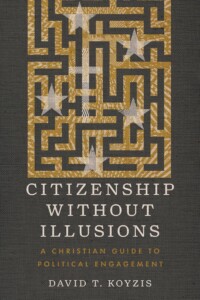
Citizenship Without Illusions: A Christian Guide to Political Engagement
For two thousand years Christians have wrestled with what it means to follow Jesus’s command to give to Caesar what belongs to Caesar, and to God what belongs to God. In Romans 13 Paul tells us we should obey and honor the authorities, and his Roman citizenship twice plays a pivotal role in the drama portrayed in the Book of Acts. The first is when Paul asks a Roman officer whether it is legal to flog a man born into Roman citizenship who has not yet been tried, and the second when Paul appeals to Caesar and so moves his legal proceedings to Rome. Apparently, birthright citizenship and due process are not merely modern concerns.
Side by side with this seeming acknowledgment of the legitimacy of earthly rule is another lesson, however, that qualifies and limits Caesar’s claims. In Acts 3 when the apostles are ordered to stop preaching in Jesus’s name, they respond “We must obey God rather than men!” In his letter to Philippi, Paul teaches that our citizenship is in heaven, and the author of Hebrews in the famous faith chapter tells us the heroes of our faith “are looking for a country of their own . . . longing for a better country—a heavenly one.” The gospels also present Jesus as a king in his own right, even if from another world, suggesting that he has a higher claim to our loyalty than does Caesar.
How can Christians manage these two different citizenships faithfully? This is the question that David Koyzis addresses in this book, namely “how do we live as citizens of his kingdom while discharging our responsibilities as citizens of our respective political communities?” (7). God has given us crucial guidance and counsel in scripture, and yet in his wisdom he seems to have left a significant role for us to exercise prudence and wisdom in applying biblical teaching to shifting political circumstances and cultural realities.
Koyzis is a well-respected and prolific elder statesman among Protestant political thinkers, and his earlier Political Visions & Illusions (2003) remains a critical touchstone for Christian political thought.1 In this latest work Koyzis draws from not only Political Visions but his 2014 follow-up, We Answer to Another: Authority, Office, and the Image of God, as well as other writings.2 Citizenship Without Illusions is a welcome contribution that will help us better think and act more faithfully as Christians with a sort of dual citizenship.
This book is a conversational and welcoming invitation to consider a host of enduring challenges for Christians engaging the public square. Koyzis’s voice is personal, and he draws from his own life and experiences in helping the reader grapple with topics like the different roles of citizenship, law, and the competing (and often idolatrous) ideologies that vie for our attention. He moves fluidly from personal reflections based on his own history to more academic (but rarely jargony) mentions of thinkers like Patrick Deneen, Hannah Arendt, Yoram Hazony, and Alexis de Tocqueville. The reader feels almost like Koyzis is engaging us in a conversation on his front porch, drawing from local life in his home of Hamilton, Ontario, as well as from his relatives in Cyprus, his boyhood in Chicago, and his connections in Brazil through the translation of his earlier work into Portuguese.
Over the course of nine chapters Koyzis offers overviews of important concepts like Christian political parties, sphere sovereignty, subsidiarity, and a host of other topics. Readers new to these subjects will find Koyzis an invaluable guide, and the footnotes point the way toward further study and investigation. In addition to helpful overviews, Koyzis offers practical advice throughout the book. Chapter 4 takes on the thorny question of when our loyalty to God’s kingdom might require disobedience to our earthly polities, linking helpful historic context with four principles to guide our own action should we find ourselves in similar circumstances. In chapter 5, “How to Vote,” Koyzis not only describes an overview of various systems of voting—while suggesting a rather different and controversial approach for Americans!—but gives the reader helpful counsel on how to vote well in a political environment in which we are not likely to be satisfied with any of our options.
I want to highlight Koyzis’s treatment of three themes that inform his work and are particularly timely. The first is the notion of pluriformity, by which Koyzis means to describe real societies marked by “a multiplicity of social formations, each of which has its proper place and normative task in God’s world” (8). That is to say, we should not be surprised by a host of distinct but interconnecting ways of engaging the world and interacting with each other, and organizations and institutions that make this possible. We should resist approaches to politics that reduce a God-authored diversity of interests and goods to a singular or totalizing earthly authority. And we should ask of any public policy proposal whether it respects the pluriformity inherent in society. Koyzis applies this in a creative and subtle way to both urban renewal and marriage (111, 115). This idea is drawn from his earlier book but informs the entirety of this work on citizenship given the importance of the roles we can play as citizens of various institutions and communities.
Second, Koyzis nicely situates Christian citizenship in between the polar opposite options that have always tempted believers. The first temptation is withdrawal from the messiness and brokenness of earthly politics, and the second is mistakenly thinking we have a divine mandate to take over that same mess and act as God’s political lieutenant on earth. Koyzis rightly notes that withdrawal is not an option given that we are called to love our neighbors (8), and one way we are called to love our neighbors is by promoting and preserving public justice; which is to say, justice not only for ourselves but our believing and unbelieving neighbors as well (31). Koyzis’s approach also precludes a call for Christians to take over society, as he emphasizes modest political aims, with pluriformity itself suggesting a sharing of earthly goods and political authority.
Third, and related to the previous two points, Koyzis’s emphasis on the importance of local politics is very welcome indeed. While of course political matters matter at the highest level in Washington, DC, and other centers of collective power, Koyzis rightly notes that the obligations of our citizenship roles are most tangible on the local level (18–19), and he skillfully draws on such disparate figures as Augustine, Hannah Arendt, and Alexander Solzhenitsyn to effectively make the case for the locus of our political efforts to be amongst those closest to us (88–93). I found Koyzis’s treatment of local politics very persuasive indeed and would love to see him connect this priority with his treatment of voting systems. Perhaps a localism embodied in a rejuvenated American commitment to federalism would contribute to a healthier politics.
With any book there are trade-offs, and the welcoming accessibility of Koyzis’s book means that it was wise for him to treat a number of topics over the course of this slim but jam-packed volume. The trade-off, however, is that his treatment of some questions can leave readers unpersuaded and hungry for a deeper treatment. For example, I was not persuaded that we should accept the validity of dual national citizenship, nor that the American voting system “wastes” votes if one’s vote does not contribute to a winning candidate or if one’s political tribe is badly outnumbered in one’s home state. I also found Koyzis’s chapter on global citizenship needing more detail and punch, particularly in contrast with his excellent emphasis on local politics throughout. If what we mean by global citizenship is a recognition that we should care for others with whom we share the planet, then all is well and good. But given the meatier conception of citizenship which Koyzis described early in the book, it’s hard to understand to what entity our global duties and responsibilities are owed. It is, rather, to particular peoples, churches, cities, groups, and fellow human beings whom we are called to engage.
But these quibbles risk giving into that perpetual temptation of the reviewer to complain that the author did not write the exact book that the reviewer wanted, and that is the last impression this reviewer wants to make. In closing, there is one more strength of both Koyzis’s book and his life’s work that must be mentioned. The job of the Christian political theorist is to help us see how things in the polis might be better, as the very etymology of the Greek theoria (to observe, view, spectate, contemplate) tells us. By this measure we have every reason to be grateful for Koyzis’s work. For though the Apostle Paul tells us we see through a glass darkly, and that can seem particularly true in matters of citizenship, David Koyzis’s work helps us see a little more light than we otherwise would.























